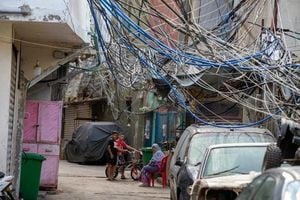New healthcare initiatives are making headlines across Atlantic Canada, especially with the introduction of innovative programs aimed at enhancing care for residents. This surge of services is focused on areas like maternal health and psychoeducational assessments for children, responding to community needs.
One of the most significant developments is the new midwifery program launched last week in Carbonear, Newfoundland and Labrador. This program plans to provide comprehensive prenatal, postpartum, and reproductive health services, set to be fully operational by February 2025.
Sarah Donnelly Harnum, who is the midwifery implementation coordinator for the provincial health authority, expressed excitement about the warm reception to the program. She noted, "There is a lot of demand, and there’s been a lot of interest," indicating the community's eagerness for these services.
The midwives involved will work closely with families, starting with those due later this year. The team is also committed to evaluating patients at Carbonear General Hospital as needed, keeping families' healthcare providers closely connected.
Donnelly Harnum highlighted midwives’ roles beyond traditional services, saying they will also be involved in cervical cancer screening and contraception counseling. This expanded scope aims to alleviate some of the pressures faced by specialists like obstetricians and general practitioners.
She said, "We can take those routine care responsibilities away from the obstetricians, which helps them focus on more complex cases." This collaboration showcases midwifery as not just about home births, but part of the broader healthcare network.
Meanwhile, at the University of Prince Edward Island (UPEI), another initiative is being pursued to help children with learning challenges. Caroline Duffie Chamandy, a doctoral student, is conducting research to improve the psychoeducational assessment processes for children.
Parents from Atlantic provinces with school-aged children who have undergone psychological learning assessments are being invited to participate in the study. Chamandy aims to gather insights on their experiences throughout the assessment process, from scheduling to receiving the final report.
The assessments usually involve interviews, observations, and tests to identify learning needs. Chamandy explained, "We learn about how a child learns, how they process information, and the ways in which they think, so we can support their learning needs."
Following the completion of assessments, recommendations are typically provided to schools by the psychologists involved, facilitating meaningful discussions among parents and teachers. This feedback loop is meant to create stronger support strategies for children’s education.
Chamandy's research seeks to identify potential gaps within the current assessment process. She insists, "Our goal is to discern if there is a gap to be bridged and then to put forth recommendations to help bridge the gap, so families get the best quality of care possible."
Both initiatives reflect the desire for improved healthcare and support systems within Atlantic Canada. With midwifery focusing on maternal and reproductive health and educational assessments enhancing children's learning experiences, the region is taking significant strides toward holistic healthcare.
The new midwifery program and the UPEI research study signify more than just improved healthcare options; they represent community awareness and responsiveness to healthcare needs. Residents are taking charge to advocate for the services they need the most.
These developments coincide with broader discussions about how healthcare systems can adapt to the needs of localized populations. By responding effectively, these initiatives not only address immediate healthcare concerns but also lay the foundation for lasting improvements.
Overall, the commitment to enhancing midwife services and refining psychoeducational assessments captures the essence of community-driven healthcare reforms. Stakeholders are hard at work, ensuring Atlantic Canada residents receive timely, relevant, and quality care.



